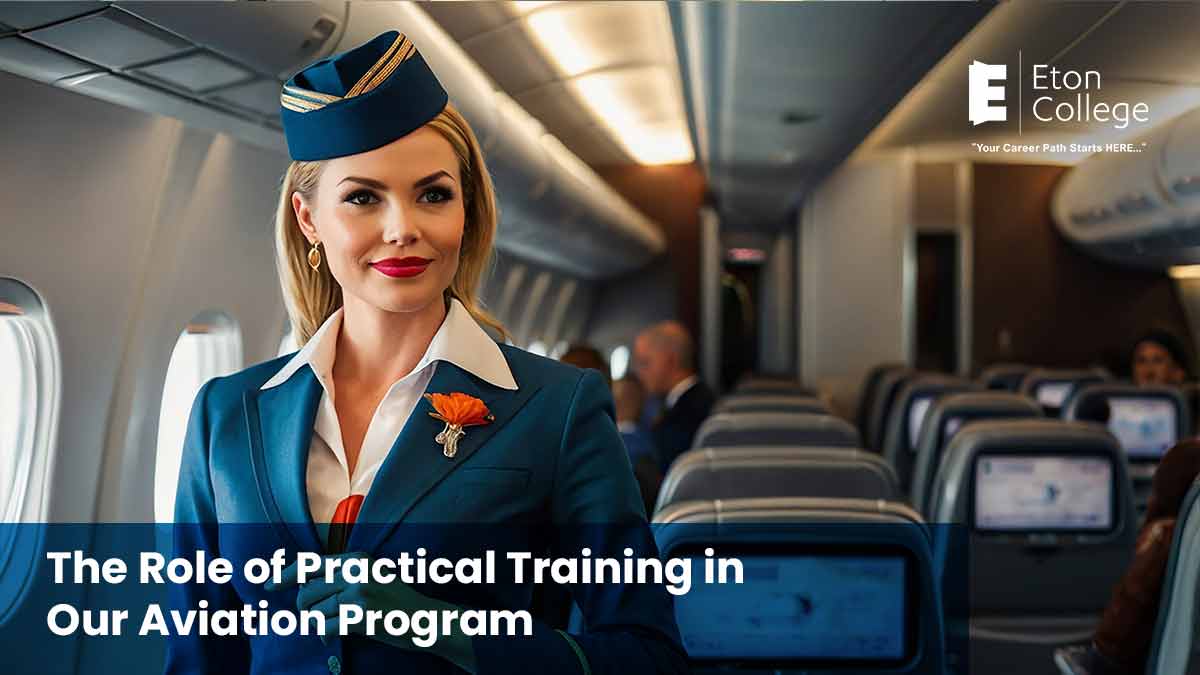- Real-life example: Discover how ‘on-job training’ of airline attendants makes all the difference between in-class learning and in-flight service.
- Building Confidence: Understand the experience of airline service representative students working under the stresses of this job through simulation and role-playing exercises.
- Safety and Emergency Preparedness: Identify why it is important to learn how to carry out the safety procedure by applying practical training for flight attendants.
- Group Teamwork and Communication: Share duties with the air hosts/hostesses enhances crew relations at the workplace.
- Most common questions regarding hands-on cabin crew training that are frequently asked about process, benefits, and results.
The aviation industry is not only a knowledge-demanding sector but a sector that requires technical skills, emotional intelligence, and practical experience. For young passenger service agents, on-the-job training would be part of their way toward success in this industry. With Eton College’s focus on practical training for flight attendants, it is only but sure that these students leave with the kind of confidence and skills required to conquer the skies.
The aviation industry is not static; it changes, so do the expectations of airline attendants. Airlines seek individuals who are sound in theory but can actually provide practical skills that can only be acquired through hands-on experiences. That is exactly what we do at Eton College: our students get prepared and ready to face up to the challenges to deliver superior service and safety to passengers around the world.
It is hands-on cabin crew training that is the principal provider to make them different aviation professionals in the future.
Major characteristics of Practical Training
An air host/hostess role is very challenging and on-job training gives the confidence in this regard, so here are some core aspects of that immersive learning experience.
-
In-Flight Simulations
For example, safety demonstrations, passenger assistance, and service delivery require demonstrations of lifelike flight scenarios. They prepare students for actual responsibilities by creating a sense of adjustment to situational changes.
-
Emergency Response Exercises
Learn the evacuation drills, fire management, and medical emergencies to be tackled during critical situations. All these drills test for speedy thought and cool heads.
-
Role-Playing Exercises
Real-life situations, such as resolving a passenger dispute or responding to concerns from a customer, help develop problem-solving and interpersonal skills.
Students also undergo a peer-to-peer feedback session in which they review and improve one another’s performance through the role-playing activity. This learning approach therefore enhances learning while creating a support system for the aspiring passenger service agents through the strength and experiences learned from others.
These units ensure that students graduate with not only technical competencies but professional demeanor required for the role of airline service representative.
Role of Applied Setting in Skill Acquisition
Practical training for flight attendants isn’t about mastering procedures, but rather building confidence and adaptability. Real-life situations help students:
-
Maximise Communication Skills
Students are able to communicate effectively with passengers and crew members in stressful situations by running teamwork exercises and role-playing.
-
Develop problem-solving skills.
Working out problems that do not work as expected in a controlled environment makes them poised to handle the first surprises that come, like delays or equipment failure.
-
Develop Emotional Intelligence
Managing passenger emotions and ensuring their comfort are critical aspects of an in-flight service professional’s role. Hands-on training teaches empathy and patience, qualities that elevate the travel experience for everyone on board.
This also enables students to remain calm and flexible when there is high pressure, like handling delayed flights or aggressive passengers. All these are scenarios of real-life occurrences, hence ensuring that students acquire resilience in maintaining professionalism under stress.
The practical training builds a readiness that cannot be taught in textbooks, hence bestowing the students with a competitive edge in this aviation industry.
Career Benefits of Hands-On Training
Hands-on training is the difference between making students job-ready and not. Here’s how it makes a difference among the students:
-
Self-Assurance in Job Interviews
Employers like candidates who can clearly say what they understand about real-world air host/hostess responsibilities. The practical training ensures the students can confidently report their skills during interviews.
-
A Competitive Advantage
Major airlines are likely to hire graduates with hands-on experience due to already being inclined with readiness to perform in real scenarios.
-
Transferable skills
This type of on-the-job training has acquired skills that are decidedly valuable in a lot of roles at and off the workplace.
In a hands-on training session, students develop portfolios of their experience. Direct achievements from documented participation in emergency drills to performance feedback from instructors are strong signals to employers that graduates will succeed from day one.
The students are qualified and know what to do to succeed from day one in a passenger service agent career.
Hands-on Airline Attendant Training FAQs
- What is air host/hostess hands-on training?
Such hands-on training exposes the steward/stewardess to simulated conditions of the like of mock flying and emergency situations that may arise in a real-world operation.
- Why do passenger service agents have to get on-the-job trained?
It covers the gap between theoretical and actual job responsibility so that sufficient confidence and competence can be built among aspiring airline service representatives.
- How long is the training?
Generally, the period of training varies but is several months long enough to have sufficient lengths.
- Can these skills be transferred to other industries?
Absolutely! Skills, like communication, problem-solving, and teamwork, are very well appreciated within a large variety of professions.
- Is there an after-training support from Eton College?
Eton College offers career development support, which includes resume building, preparation for interviews, and placement.
- What facilities does Eton College use for its practical training?
Eton College offers state-of-the-art facilities simulating the real environment of an aircraft cabin, including mock cabin setups, safety equipment, and in-flight service stations, which will offer authentic training for the students.
From Classroom to Cabin—Your Journey Begins
At Eton College, we understand that it is not just a book that makes an airline service representative member. Our hands-on training for airline attendants prepares students well for the challenges and rewards that accompany an air host/hostess career. Its intent goes to first-career learners such that any career change into aviation means much added knowledge with personal growth on and off the job with more appropriate preparation and equipping and with confidence, venturing the unknown skies.
Graduates leave with not only certifications but also the confidence, professionalism, and hands-on experience that sets them apart in the industry. If you are ready to take your journey to an even higher level to reach your passenger service agent goal, then Eton College is here to help you soar. So this is your step towards success today, sign up for checking out our program-the first step toward the aviation career of your choice.




